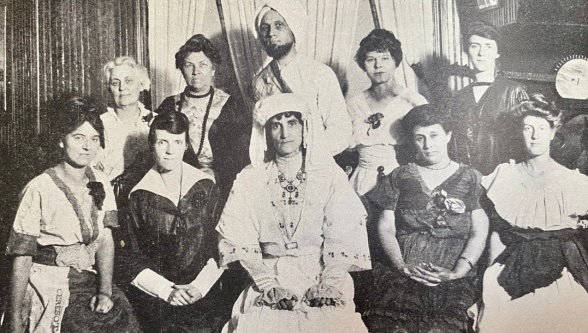Times were hard around the world in October of 1914, as war careened through Europe and the U.S. economy was in recession. Here in the nascent Village of Lake Bluff, year-round villagers were making do as best they could. One group of Lake Bluff women and a few men decided to throw a “Hard Times Party,” wearing home-made gowns “that cost all the way from seven to forty-eight cents each,” according to the October 8, 1914, edition of The Lake Bluff Chat newspaper.
Gowns, accessories and other outfits were fashioned out of fabric and other materials found around the house, including mosquito netting, flour sacks, shelving paper, autumn leaves – even some cork.
“It was as beautiful a ball as could be imagined, and demonstrates that money is subservient to ingenuity. Stately women and beautiful girls gowned in all colors of the rainbow flitted about like pretty butterflies on a sunny-spring morning,” The Chat reported.
The gowns were so creative that their provenance wasn’t immediately obvious. One woman at first told her husband that her gown cost $175 – a shocking amount. He suspected she had been shopping at Marshall Field’s. “I thought this was a hard times party,” he excoriated her. “Your pocketbook will look like a hard times party when you pay for it!” Upon closer inspection, he was relieved when he saw the words “shelving paper” stamped on the material. His wife’s home-made dress, it turned out, cost 32 cents.
Not everyone was tastefully dressed. One man showed up in a white suit with a cork-helmet hat punctured in bullet holes. The Chat editor Isabella Ross described him as “a tourist returned from Europe.” Some guests dressed in outfits that represented French, Belgian and English “warriers and refugees from the battlefields of Europe,” which had been at war only a few months. (The U.S. had not yet entered the war.)
The party’s theme was fashioned after a song called “Hard Times Come Again No More,” written in 1854 by Stephen Foster. He was an acclaimed American songwriter who wrote hundreds of songs, including “Oh! Susanna” and “De Camptown Races.”
The Hard Times Party was held at the Lake Bluff Country Club, a social club located at the northeast corner of Center Avenue and Moffett Road. The club was built in 1897 just weeks after fire destroyed the Hotel Irving, which had been the center of Lake Bluff’s social life.
The Hard Times Party was such a hit in the village that it had the potential to “establish a new national era in dress reform,” according to The Chat.
